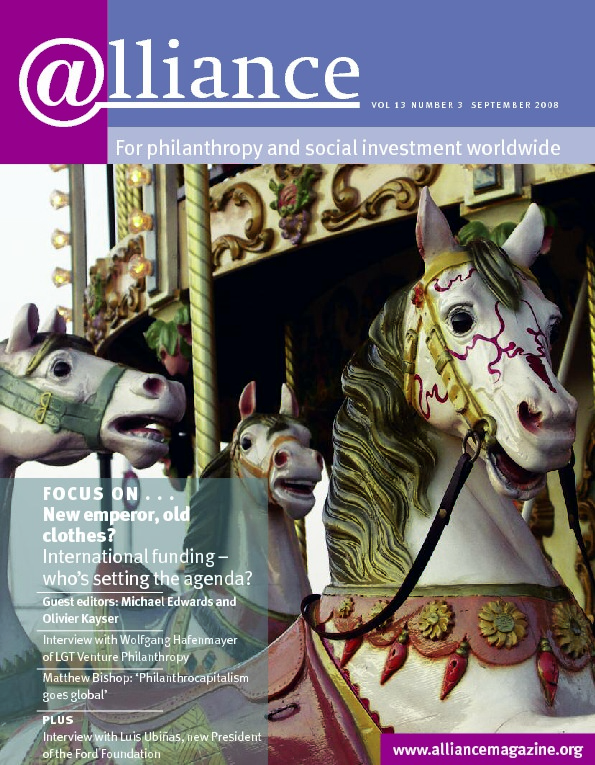In this article, three funders from the Global South, all part of a network of foundations working for peace in their societies, describe how they set their own agenda, work closely with their grantees, and act as a bridge between southern activists and northern donors. As foundations working in divided societies, the issue of ‘who sets the agenda?’ is something of a luxury. The agenda is set by structural inequalities, unjust practices, and the ever-present threat of violence.
These issues are common for us and for our grantees and we tackle them together as equal partners. Such equality is a vital part of our approach. We believe that if inequality is there from the start, it will continue through to the end. To paraphrase Gandhi: ‘We need to be the change we want to see in the world.’ You see this principle at work in many women’s foundations across the world.
We, as funders, are part of the societies that we are trying to change – as citizens, residents and members of oppressed groups. This means we are ‘activist funders’. This is quite a different experience from being part of an international donor community that targets the Global South from a northern continent. We cannot move out of the country by changing our grants criteria, and people know where we live.
To give some examples: the Neelan Tiruchelvam Trust in Sri Lanka was set up by Neelan’s widow, Sithie Tiruchelvam, to continue his efforts to build peace after he was assassinated. Funding is based on an equal partnership with, for example, the Families of the Disappeared, an organization that supports people who lost loved ones through more than 60,000 disappearances in the past 20 years. The Trust also funds the Association of Disabled Ex-Service Personnel whose 11,800 members are using the moral authority of their situation to advocate a negotiated settlement of the war.
The Dalit Foundation works to eradicate caste discrimination in the Indian subcontinent. It addresses the problem by working on both sides of the caste divide, believing that emancipation is for all and not just for ‘untouchables’. The Foundation defines a Dalit as ‘anyone who believes in equality and justice’. One of its grants goes to the Men’s Institute of Development and Training to end the practice of ‘manual scavenging’ (the manual collection and disposal of human waste) among people classed as untouchable.
AlvarAlice Fundación in Colombia funds Paz y Bien, a grassroots organization that works with young people who are victims of urban violence and forced displacement. Over 400 victims gather every Thursday in Jueves de Paz for mutual support sessions. The sessions help people to cope with their grief and resentment and to build new lives.
In all of our grants, we have to be even-handed and non-partisan, otherwise we will make the conflict worse. Indeed, building interdependence and equality within a framework of diversity is a necessary condition of being allowed to join Foundations for Peace. This network, developed initially by the Community Foundation for Northern Ireland, has eight members from different conflict zones and includes both northern and southern foundations.
The advantages of activist funders are that we are small, nimble and free from a bureaucratic, top-down organizational style. Being close to the action, we can process grants quickly and respond to crises, offering hands-on assistance as well as money if need be. We can give small grants, with low overheads, and we can take calculated risks. We can spot emerging leadership and support it. We have all come to see the importance of the role of women in building peace and justice, and of supporting their efforts.
But there are drawbacks. Being part of the community means that people often accuse us of not being even-handed. And the advantages of smallness and nimbleness are weaknesses when it comes to resources. Inevitably we come from countries where there has been little asset development and the conflict has rendered economies weaker than they otherwise would be. This means that we are reliant on northern donors.
However, we can be a useful bridge between North and South. There are three dimensions to this. First, investing in us shifts the burden of decision-taking from North to South. Second, such investments are sustainable since we are building endowments and will eventually be free of subsidy. Third, and most important, we are part of the marginalized communities that northern donors may be trying to reach, so that investing in our foundations is a practical way for northern donors to operate in a culturally sensitive way in some of the most dangerous parts of the world.
Sheila Richards is Executive Director of the Neelan Tiruchelvam Trust. Email sheila_richards2003@yahoo.com
Oscar Rojas is Executive Director of AlvarAlice. Email rojaso@alvaralice.org
Santosh Samal is Executive Director of The Dalit Foundation. Email dalitfoundation@vsnl.net
For more information
Contact Monina O’Prey, Coordinator of Foundations for Peace, at monina@foundationsforpeace.org or visit http://www.foundationsforpeace.org


Comments (0)